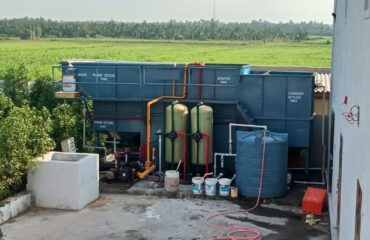Introduction
In recent years, the food industry has witnessed substantial growth, resulting in increased production capacities and an inevitable rise in wastewater generation. Ajmer, with its thriving food processing sector, is no exception. Managing and treating wastewater is crucial to mitigate environmental impacts and comply with regulatory standards. Amrita Water Solution specializes in providing advanced wastewater treatment solutions tailored for the food industry in Ajmer. This article delves into the importance, benefits, and key considerations of implementing a wastewater treatment plant in this sector.
Importance of Waste Water Treatment in the Food Industry
Environmental Responsibility
Food industries generate a significant amount of wastewater laden with organic matter, fats, oils, greases, and chemicals. If not treated properly, this wastewater can severely impact the environment by contaminating water bodies, harming aquatic life, and disrupting ecosystems. Installing an efficient wastewater treatment plant is a critical step towards environmental sustainability.
Regulatory Compliance
Governments and environmental agencies have stringent regulations regarding the discharge of industrial effluents. Non-compliance can lead to hefty fines, legal actions, and even shutdowns. Food industries in Ajmer must adhere to these regulations to ensure smooth operations and avoid penalties. Amrita Water Solution provides state-of-the-art treatment plants designed to meet these compliance requirements effectively.
Resource Recovery
Advanced wastewater treatment processes enable the recovery of valuable resources such as water, energy, and nutrients. Recycled water can be reused within the facility for non-potable applications, thereby reducing the overall water footprint. Additionally, biogas generated from anaerobic digestion of organic waste can be used as a renewable energy source, contributing to the industry’s sustainability goals.
Benefits of Implementing a Waste Water Treatment Plant
Enhanced Operational Efficiency
An efficient wastewater treatment system enhances the operational efficiency of food processing units. By treating and reusing wastewater, industries can significantly reduce their freshwater consumption. This not only cuts down on water procurement costs but also ensures a reliable water supply for continuous operations.
Cost Savings
While the initial investment in a wastewater treatment plant may seem substantial, the long-term cost savings are significant. By reducing water usage, lowering waste disposal costs, and recovering valuable resources, food industries can achieve substantial financial benefits. Amrita Water Solution offers cost-effective solutions tailored to the specific needs of the food industry in Ajmer.
Improved Public Image
Sustainable practices and environmental stewardship are increasingly becoming important to consumers. By adopting advanced wastewater treatment technologies, food industries can enhance their public image and demonstrate their commitment to environmental responsibility. This can lead to improved brand loyalty and increased market share.
Key Components of a Waste Water Treatment Plant
Pre-Treatment
Pre-treatment involves the removal of large solids, grit, and grease from the wastewater. This step is crucial to prevent clogging and damage to downstream equipment. Screens, grit chambers, and oil separators are commonly used in this stage.
Primary Treatment
Primary treatment focuses on the removal of suspended solids and organic matter. Sedimentation tanks or clarifiers are employed to settle out solids, while skimming devices remove floating materials such as fats and oils.
Secondary Treatment
Secondary treatment is aimed at biologically degrading the dissolved organic matter in the wastewater. This is typically achieved through aerobic processes such as activated sludge systems, trickling filters, or bio-towers. Microorganisms break down organic pollutants, resulting in cleaner effluent.
Tertiary Treatment
Tertiary treatment involves advanced processes to further polish the effluent and remove any remaining contaminants. Techniques such as filtration, chemical precipitation, and disinfection (using chlorine or UV light) are employed to ensure the treated water meets stringent discharge standards.
Sludge Management
Wastewater treatment generates sludge, which needs to be managed effectively. Sludge treatment processes such as thickening, dewatering, and anaerobic digestion are employed to reduce the volume and stabilize the sludge. The treated sludge can be safely disposed of or used as a soil conditioner.
Conclusion
In conclusion, the installation of a wastewater treatment plant is essential for the food industry in Ajmer. It not only helps in achieving regulatory compliance but also brings about significant environmental and economic benefits. Amrita Water Solution offers comprehensive and advanced wastewater treatment solutions designed to meet the unique needs of the food processing sector. By investing in a robust treatment system, food industries can ensure sustainable operations, enhance their public image, and contribute to a cleaner environment.





